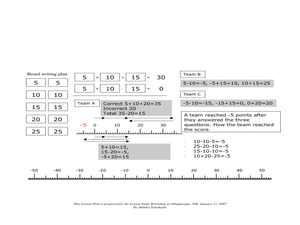Curriculum Corner
“I Can” Common Core! 1st Grade Math
Any first grader can master the Common Core math standards with this checklist! With each standard rewritten as an affirmative I can statement, children are provide with clear goals to work toward throughout the school year.
Display an...
Curated OER
Decimal Problems
In this decimals worksheet, students solve 18 different types of problems that include both decimals and non-decimals. First, they subtract the measurement problems given both in metric units and in US units. Then, students subtract the...
Curated OER
Most and Least
Which one has the most? Each row has three sets of identical objects, and scholars compare the sets to determine which has the most or the least (they find the most for the first four and the least for the last four). One example is...
Curated OER
Use Google Maps to Teach Math
Capture the engagement of young mathematicians with this upper-elementary math lesson on measuring time and distance. Using Google Maps, young scholars first measure and compare the distance and time it takes to travel between different...
Curated OER
Double Your Money
What a creative way to delve into adding large numbers! After listening to a story called The King's Chessboard, learners estimate how much money they would have each day following instructions based on doubling and exponentially...
Charleston School District
Scientific Notation Operations
How do you operate with numbers in scientific notation? The resource provides examples on how to divide and multiply with numbers written in scientific notation. The handout and video also cover the procedure for addition and subtraction...
CK-12 Foundation
Properties of Rational Numbers: Lollipop Trees
A six-question interactive takes mathematicians to Lollipop Land where they manipulate lollipop trees to make equivalent ratios. Question types include multiple-choice, true or false, and a discussion.
Mathed Up!
Ordering Numbers
Young mathematicians order numbers from least to greatest. Number types include whole numbers, decimals, and negative numbers.
Curated OER
Shapes Game
Show your youngsters how to discern between shapes of different sizes, types, and colors. After the initial introduction, learners choose the type, color, and size of the shape instructed during a game with the whole class.
Illustrative Mathematics
Ordering 3-Digit Numbers
Second graders are asked to order two sets of two- and three-digit numbers from greatest to least, and then least to greatest.
Curated OER
Real Numbers in the Real World
Delve into the concept of operating on the set of real numbers! In this operating with the set of real numbers lesson, pupils perform order of operations on the set of real numbers using a calculator.
Curated OER
Comparing and Ordering Decimals - Complete Lesson Plan
Base ten blocks serve as visual representations of numbers that include decimals to the hundredths place. Children compare and order decimals in their math journal as they build the corresponding numbers with base ten blocks.
Curated OER
Ordering Rational Numbers and Finding Their Approximate
Middle schoolers explore the concept of ordering rational numbers on a number line. They represent rational numbers as decimals and percents. Pupils create a foldable about converting fractions to decimals to percents, and use a...
Curated OER
Compare and Order Numbers
Students compare and order numbers to 100. They count numbers forwards and backwards. Given specific numbers, students place the numerals in the correct order. Students use bean bags, cubes, or blocks to compare and order numbers.
Curated OER
Numeracy
Students review numbers, number systems and the number operations through the use of online webpages.
Curated OER
Playing Math Fever
Pupils complete activities to learn notation and uses for positive and negative numbers. In this number system instructional activity, learners play a game similar to Jeopardy to learn how to solve problems with positive and negative...
Alabama Learning Exchange
As If Numbers Weren't Complex Enough Already!
The class explores the concept of complex numbers on a website to generate their own Mandelbrot sets. They will practice performing operations with complex numbers and then to get a visual understanding, graph the absolute value of a...
Norm Mitchell
Quiz: Representing, Comparing, and Ordering Decimals
Here is a 42-question quiz dealing with decimals to the thousandths place. It is comprehensive in that it has test takers use inequality signs to compare pairs of decimal numbers, choose the least- or greatest-valued nubmer out of a set...
Illustrative Mathematics
Comparing Rational and Irrational Number
Algebra learners must know how to use rational numbers to approximate irrationals. This resource asks participants to decide which number is larger without using a calculator. It makes a great exercise to use as a five-minute transition...
Curated OER
Unit 5: Order Whole Numbers in the 100s and 1,000s
There are three quick number ordering activities here for your mathematicians. First, they analyze data on the number of three types of pies sold. Scholars choose from four ordered lists the one showing fewest to most sold. Then, they...
Curated OER
Using Numbers Everywhere
Kindergarteners explore various representations and uses of numbers to develop number sense. They participate in an activity and arrange patterns into groups. Students compare the sets and describe the objects in each set.
Curated OER
Chapter 2 Review: Prime Factorization
In this prime factorization activity, learners find the prime factorization of numbers by using a factor tree. They compare fractions and identify equivalent fractions, and find the greatest common factor, order numbers, and convert...
Curated OER
Compare and Order Fractions
In this compare and ordering fractions worksheet, learners compare fractions and order them from least to greatest. Students compare 6 fractions and order 20 sets of fractions, and answer 4 word problems.
Curated OER
Comparing Fractions and Equivalence
Which fraction is greater than? Less than? There are 10 problems here that give scholars a visual approach to comparing fractions. They start by writing the fractions represented in a shaded shape. Then, they begin comparing visual...

























